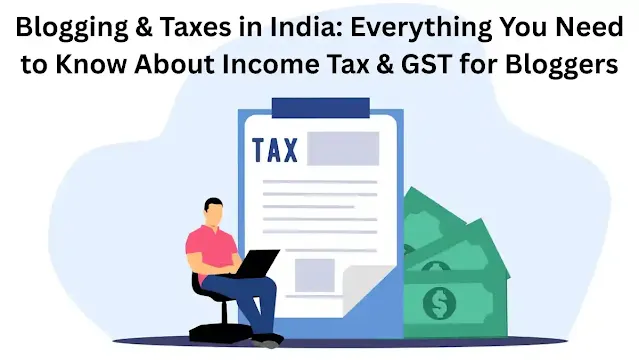Blogging & Taxes in India: Everything You Need to Know About Income Tax & GST for Bloggers
The digital era has reshaped the way individuals earn their livelihood. With just a smartphone and internet access, numerous income-generating opportunities have emerged—blogging, vlogging, content creation, and affiliate marketing, to name a few. While these fields provide flexibility and creative freedom, they also introduce a major question: How do bloggers pay taxes on their income?
Unlike traditional job roles, where income and tax deductions are relatively straightforward, self-employed professionals such as bloggers often struggle with tax compliance. This article provides a comprehensive guide to how bloggers should assess their earnings and fulfill their tax obligations.
Understanding Blogging as an Income Source
A blog serves as a digital platform where individuals share
insights, research, experiences, and expertise. Bloggers may own their websites
or use third-party platforms such as WordPress or Google Blogger
to publish their content.
A blogger’s success and earnings depend on multiple factors,
including:
- Niche Selection (technology, food, finance, gaming, lifestyle, etc.)
- Audience Engagement (loyal readers, returning visitors)
- Monetization Strategies (advertising, sponsorships, courses, etc.)
- Geographical Reach (international vs. local audience)
Understanding these factors helps bloggers structure their revenue streams effectively.
Sources of Income for Bloggers
Bloggers do not have a fixed salary, and their income varies
based on engagement levels and monetization techniques. To achieve financial
stability, diversification is key. Here are some common revenue streams for
bloggers:
1. Advertisements
One of the most popular income sources is ad revenue.
Bloggers integrate display ads from services like Google AdSense, where
they get paid based on impressions (views) and clicks on the ads displayed on
their website. More traffic means higher earnings, but ad rates fluctuate based
on user location and browsing behavior.
2. Affiliate Marketing
Another lucrative option is affiliate marketing.
Bloggers promote products or services by embedding unique tracking links within
their content. Whenever a visitor purchases a product using their link, they
earn a commission. Some well-known affiliate programs are Amazon
Associates, ShareASale, and Commission Junction.
3. Sponsored Posts & Paid Reviews
Companies often collaborate with bloggers to promote
their products through detailed reviews, tutorials, or recommendations. In
return, bloggers receive a fixed payment or commission based on
engagement levels.
4. Freelancing & Consultancy
As expertise grows, bloggers can expand their services to
include:
- Writing paid articles for other platforms
- Providing SEO consultancy
- Offering digital marketing services
- Designing and optimizing websites
5. Online Courses & E-Books
Many bloggers create digital products, such as
e-books, courses, or templates, offering valuable insights to their audience
while generating passive income.
Taxation for Bloggers in India
Since bloggers work independently, their income falls under
the category of "Income from Business/Profession." But does
blogging classify as a business or profession?
- If a
blogger primarily provides services (content writing, marketing,
consultancy), it is considered a profession.
- If a
blogger earns through advertisements, product sales, and affiliate
marketing, it may be treated as a business.
Regardless of classification, all income earned through
blogging is taxable.
How to File Income Tax Returns (ITR) for Blogging
There are two primary methods for bloggers to file
their taxes:
1. Regular Tax Scheme
Under this method, bloggers must maintain proper books of
accounts and record all transactions, including income and expenses. While
filing their Income Tax Return (ITR), bloggers can claim deductions for
business-related expenses such as:
|
Expense Type |
Description |
|
Website Maintenance |
Domain registration, website upkeep costs |
|
Hosting Services |
Expenses for server hosting (e.g., Bluehost, AWS) |
|
Depreciation on Equipment |
Laptops, cameras, software, etc. |
|
Marketing & Promotion |
Paid ads, influencer marketing |
|
Content Creation Costs |
Graphic design, video editing, paid tools |
|
Office Rent & Utilities |
If working from a dedicated space |
|
Professional Fees |
Legal, accounting, and consultancy charges |
By maintaining these records, bloggers can reduce their
taxable income significantly.
2. Presumptive Taxation Scheme (Section 44ADA)
For bloggers who prefer a simplified tax approach,
Section 44ADA of the Income Tax Act offers an alternative:
- 50%
of the gross receipts are deemed as taxable income.
- The
remaining 50% is considered as expenses (no need for record-keeping).
- Bloggers
only pay tax on the net income after deductions.
This method is particularly beneficial for small bloggers
who don’t wish to maintain detailed books of accounts.
GST Applicability for Bloggers
Another crucial aspect of taxation is the Goods and
Services Tax (GST). Bloggers earning through affiliate marketing,
advertisements, or selling digital products may be liable to register for GST
if their annual revenue exceeds ₹20 lakh (₹10 lakh in special category states).
- GST
Rate for Bloggers:
- Google
AdSense Earnings – Export of Services (18%)
- Sponsored
Posts (Domestic Clients) – 18% GST
- Affiliate
Income (Foreign Clients) – 0% under export services
If earnings are primarily from foreign sources,
bloggers can apply for Letter of Undertaking (LUT) to claim GST
exemption.
Final Thoughts
Blogging is a rewarding profession, but tax compliance is
crucial to avoid penalties. Bloggers should determine their income category,
maintain financial records, and choose between regular taxation or
presumptive taxation under Section 44ADA. Additionally, those
crossing the GST threshold must comply with GST regulations.
To ensure smooth tax filing, consulting a professional
tax advisor is highly recommended. Need help with filing your Income Tax
Return (ITR) and fulfilling compliance obligations? Feel free to contact us for
expert guidance.
Stay compliant, maximize savings, and focus on what you
do best—creating amazing content!
Read More: Income Tax Slab and Rates F.Y.2024-25 or income tax slab for ay 2025-26
